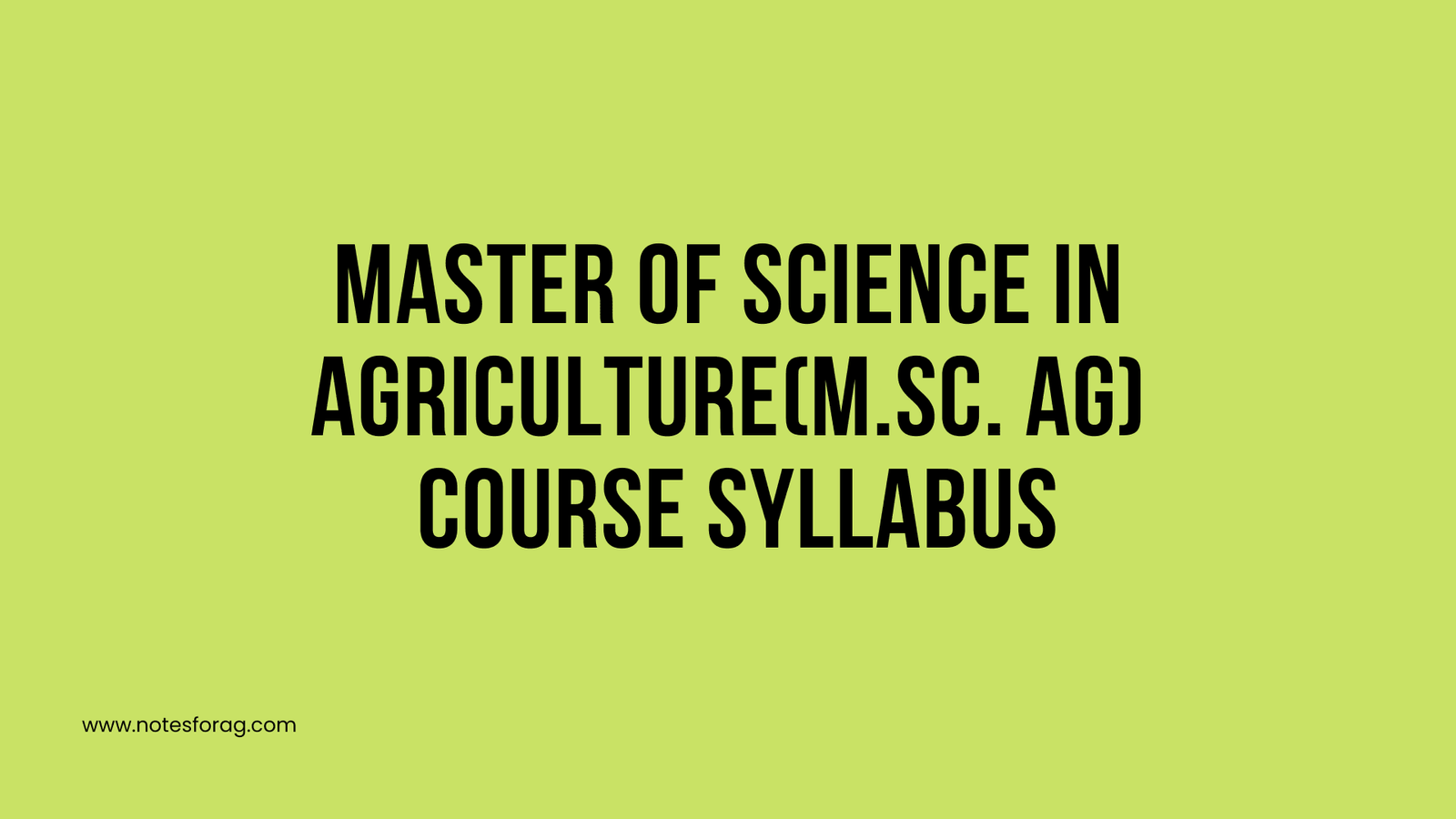The Master of Science in Agriculture (M.Sc. Ag) is a postgraduate degree that offers advanced knowledge and specialized training in various fields of agricultural sciences. In India, this program is highly valued as it equips students with in-depth expertise in areas such as agronomy, horticulture, plant pathology, soil science, agricultural economics, entomology, and more. Offered by premier agricultural universities like IARI (Indian Agricultural Research Institute), Tamil Nadu Agricultural University, Punjab Agricultural University, and others, the Master of Science in Agriculture degree focuses on research, practical applications, and innovation to address challenges in Indian agriculture. It plays a critical role in enhancing productivity, sustainability, and food security in a country where agriculture supports the livelihood of a majority of the population.
Graduates of Master of Science in Agriculture in India have excellent career opportunities in academia, research institutions, government departments, agribusiness firms, NGOs, and international organizations. The degree also prepares students for roles in policy-making, extension services, and agricultural consultancy. Many students pursue this degree to engage in cutting-edge research and development, contributing to technology transfer and modernization of Indian agriculture. Furthermore, Master of Science in Agriculture serves as a stepping stone for doctoral studies (Ph.D.) and professional advancements, fostering expertise that supports India’s goal of sustainable agricultural growth and rural development.
The Master of Science in Agriculture subjects and syllabus are designed to meet the following course objectives:
- To provide knowledge and help the students gain the ability for analysis, discussion, using tools and techniques, etc.
- To help them understand what would be their responsibility in the professional world and how they would achieve success through continuous professional development
- The course imparts knowledge of terms and terminologies implemented in the field
- It gives an overall idea of the agriculture industry of the nation. The students identify the ways to bring development to the field
- The course focuses on agriculture machinery, plant management, and biochemistry, and gives scientific information on agriculture and farming
Table of Contents
Examination System
1. Internal Assessment
- Theory Courses: Internal assessments typically include mid-semester exams, assignments, quizzes, and class participation. For instance, Kerala Agricultural University allocates 40% to midterm exams and 10% to assignments, totaling 50% for internal evaluation in theory courses .
- Practical Courses: Evaluation comprises lab performance, records, viva-voce, and assignments. At Kerala Agricultural University, practical evaluations are weighted at 60% for final exams, with additional components like assignments and viva contributing to the overall score .
2. Final Theory and Practical Examinations
- Theory Exams: Conducted at the end of each semester, covering the entire syllabus. For example, Kerala Agricultural University mandates a minimum of 40% marks in theory exams for successful course completion .
- Practical Exams: Held separately, assessing hands-on skills and application of theoretical knowledge. A minimum of 40% marks in practical exams is required for passing .
3. Attendance Requirement
- Minimum Attendance: An 85% attendance rate is generally required in both theory and practical classes to be eligible for final examinations. For instance, IARI New Delhi enforces an 85% attendance rule for both theory and practical classes .
- Relaxation: Some universities may grant a 10% relaxation in attendance for valid reasons upon application .
4. Grading System
- Grade Points: Grades are assigned based on marks obtained, with a common scale being:
- 90–100%: Grade O (Outstanding), Grade Point 10
- 80–89%: Grade A+, Grade Point 9
- 70–79%: Grade A, Grade Point 8
- 60–69%: Grade B+, Grade Point 7
- 50–59%: Grade B, Grade Point 6
- Below 50%: Fail (F), Grade Point 0
- Pass Criteria: A minimum of 50% marks in both theory and practical components is required to pass a course. For example, Kerala Agricultural University specifies that a separate minimum of 40% marks in theory and practical examinations is necessary for successful completion of a course .
- Grade Point Average (GPA): Calculated based on the weighted average of grade points across all courses in a semester. To complete the degree requirement, a minimum Overall Grade Point Average (OGPA) of 6.00 out of 10.00 is typically required.
Year Wise Syllabus for Master of Science in Agriculture 2025
The Master of Science in Agriculture (M.Sc. Ag) program in India typically takes 2 years to complete. It is usually divided into 4 semesters over these two years, combining coursework, practical training, and research projects or thesis work.
First-Year Syllabus for Agriculture Science
Tabulated below are the topics and subjects that you will be studying in the first year of your course program:
| Master of Science in Agriculture- Semester 1 | |
|---|---|
| Principles and Practices of Water Management | Micro Economic Theory and Application |
| Principles of Nematology | Plant Biochemistry |
| Basic Plant Breeding | Agrometeorology and Crop Weather Forecasting |
| Principles and Practices of Soil Fertility and Nutrient Management | |
| Master of Science in Agriculture- Semester 2 | |
| Plant Genetic Resources and Seed Technology | Modern Concepts in Crop Production |
| Dryland Farming and Watershed Management | Agricultural Statistics |
| Cropping Systems and Sustainable Agriculture | Principles of Cytogenetics |
| Principles of Quantitative Genetics | |
Second-Year Syllabus for Agriculture Science
Tabulated below are the topics and subjects that you will be studying in the second year of your course program:
| Master of Science in Agriculture- Semester 3 | |
|---|---|
| Agronomy of Major Cereals and Pulses | Cropping System And Sustainable Agriculture |
| Irrigation Management | Basic Horticulture |
| Toxicology of Insecticides | Integrated Livestock Farming System |
| Agronomy of Fodder And Forage Crops | Econometrics |
| Specialization-1 | Specialization-2 |
| Master of Science in Agriculture- Semester 4 | |
| Agri Marketing Basics | Advances in Crop Production |
| Agrostology | Practical Training |
| Research Project | Internship |
Further more, Bachelor of Technology in Agricultural Engineering (B. Tech Ag Engineering) Course Syllabus – Click Here

